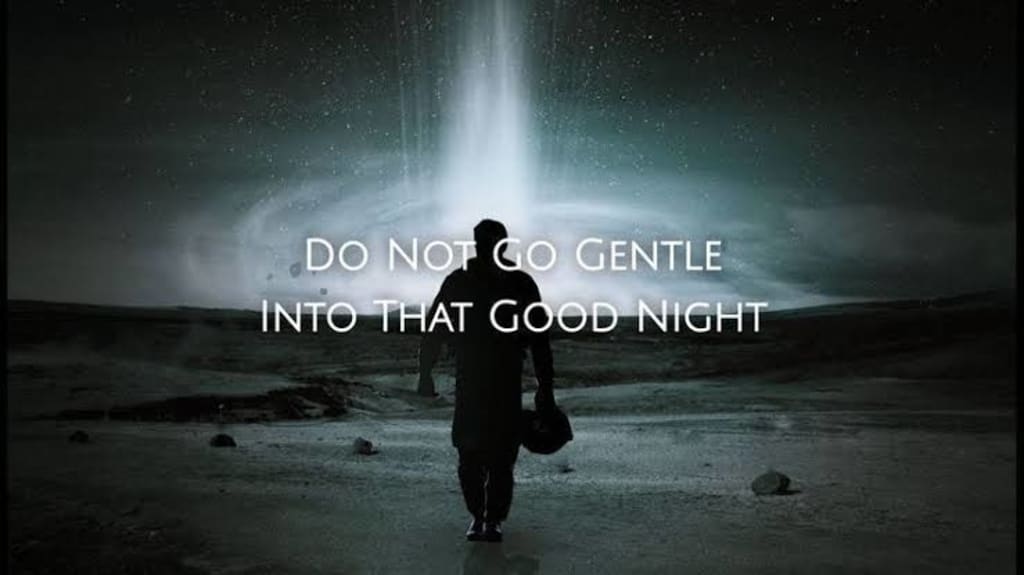Do not go gentle into the good night
A poem

In the cosmic tapestry of existence, Dylan Thomas wove verses that transcended mortality. "Do Not Go Gentle into That Good Night" emerged as a clarion call, a sonorous rebellion against the inevitability of fading light. Within its lines, a cosmic battle unfolded, pitting mortal fragility against the relentless march of time.
Thomas' invocation resonates with the echoes of defiant souls, urging them to resist the tranquility of death's embrace. As the title unfurls, the imperative refrain reverberates—an urgent plea to shatter the quietus that beckons every mortal. "Do not go gentle," the bard beseeches, intertwining vulnerability with resilience, mortality with rebellion.
The opening stanza sets the stage, casting shadows upon the inevitability of the "good night." A night that isn't merely nocturnal but cosmic, a celestial metaphor for the culmination of earthly existence. The word "gentle" dances in a paradoxical waltz with the impending darkness, invoking a primal urge to confront it with fiery defiance.
Thomas, the maestro, orchestrates a symphony of resistance. The poem is a villanelle, a form demanding meticulous cadence, and in this structure, the poet crafts an incantation against surrender. The refrain becomes a mantra, an exhortation repeated like a heartbeat, pulsating with the essence of existence.
As the stanzas unfold, Thomas paints a kaleidoscope of human experiences. The imagery of various life stages—youth, age, and wisdom—anchors the poem in the shared human odyssey. Each archetype becomes a battleground where the human spirit wrestles with its mortality.
"Wild men" and "grave men," emblematic of passion and profundity, grapple against the looming night. The poet invokes the archetypes not as isolated entities but as facets of a collective human struggle. In this cosmic wrestling match, Thomas immortalizes the human spirit's resilience, echoing across the eons.
The poet's father, a tangible presence within the verses, becomes both a beacon and a shadow. The invocation "Rage, rage against the dying of the light" acquires a personal cadence, infusing the poem with filial urgency. Thomas mourns the impending loss, transcending the realms of grief into a fervent plea for rebellion.
The second stanza unfurls as a tapestry of celestial metaphors, illustrating the cyclical nature of existence. From the "close of day" to the "frail deeds" of the dying sun, Thomas crafts a cosmic allegory for life's transience. The juxtaposition of the dying sun with men "at their end" merges the cosmic and the mortal into a seamless continuum.
In the third stanza, the poet casts a spotlight on the dichotomy of reason. The wise, "because their words had forked no lightning," face the same inexorable fate as the wild and the grave. Thomas plays with the irony of wisdom, hinting that even the sagacious, untouched by the tempests of radical conviction, are not spared the night's descent.
The fourth stanza emerges as a crescendo of emotional intensity. Thomas unleashes an avalanche of powerful metaphors, invoking a gamut of human emotions. From the "tears" of the mourners to the "blinding sightless eyeballs" of the blind, the poet transcends the visual spectrum to delve into the visceral core of human experience.
As Thomas sails through the varying hues of human resistance, the refrain echoes like a clarion call, an unyielding pulse. The poet's father, cast as a spectral figure, epitomizes the human struggle against the impending eclipse. The urgency within the refrain transcends individual mortality, becoming an anthem for the collective human journey.
The fifth stanza invokes the night's "lightning," a metaphorical harbinger of death. Thomas, ever the master of linguistic alchemy, transforms this symbol into an agent of defiance. The poet implores the aged to "burn and rave," to illuminate the encroaching dark with the incandescence of their rebellious fervor.
The penultimate stanza is a poignant tableau of familial intimacy. Thomas portrays the tragedy of those who "caught and sang the sun in flight" but find themselves caught in twilight's grasp. The evocative imagery of birds soaring against the dying light becomes a testament to the ephemeral nature of existence.
The concluding stanza is a triumphant crescendo, an epiphany of fervor. Thomas, embracing both the personal and the collective, beckons the reader into a cosmic alliance. The poet, through the refrain's relentless repetition, weaves a cosmic chant, an anthem of resistance that transcends individual destinies.
As the poem unfurls its final verses, the incantation persists—an everlasting echo of defiance. Thomas immortalizes not just his father but every soul who confronts the cosmic night with fiery determination. "Do not go gentle into that good night" metamorphoses into a cosmic hymn, a timeless anthem of the indomitable human spirit.
In the timeless tapestry of literature, "Do Not Go Gentle into That Good Night" stands not merely as a poem but as a celestial sonnet etched into the firmament of human consciousness. Dylan Thomas, with his mastery, gifted the world a verse that transcends mortality, beckoning every reader to rage against the dying of the light.





Comments (2)
This is great! I’m very impressed by your writing skills! You have a super natural talent for writing! Genuinely amazing!
Your writing skills are truly impressive. I loved it.